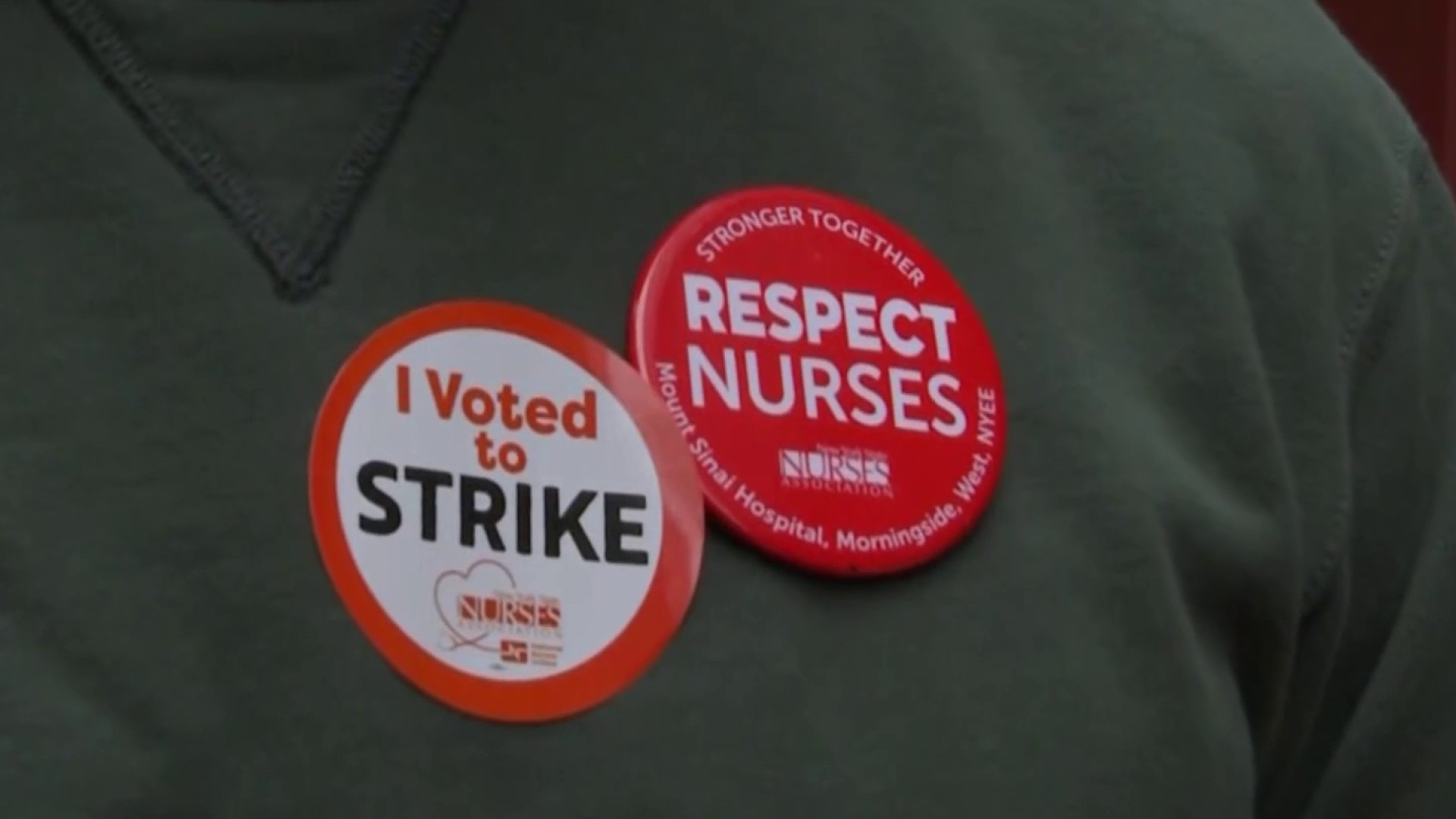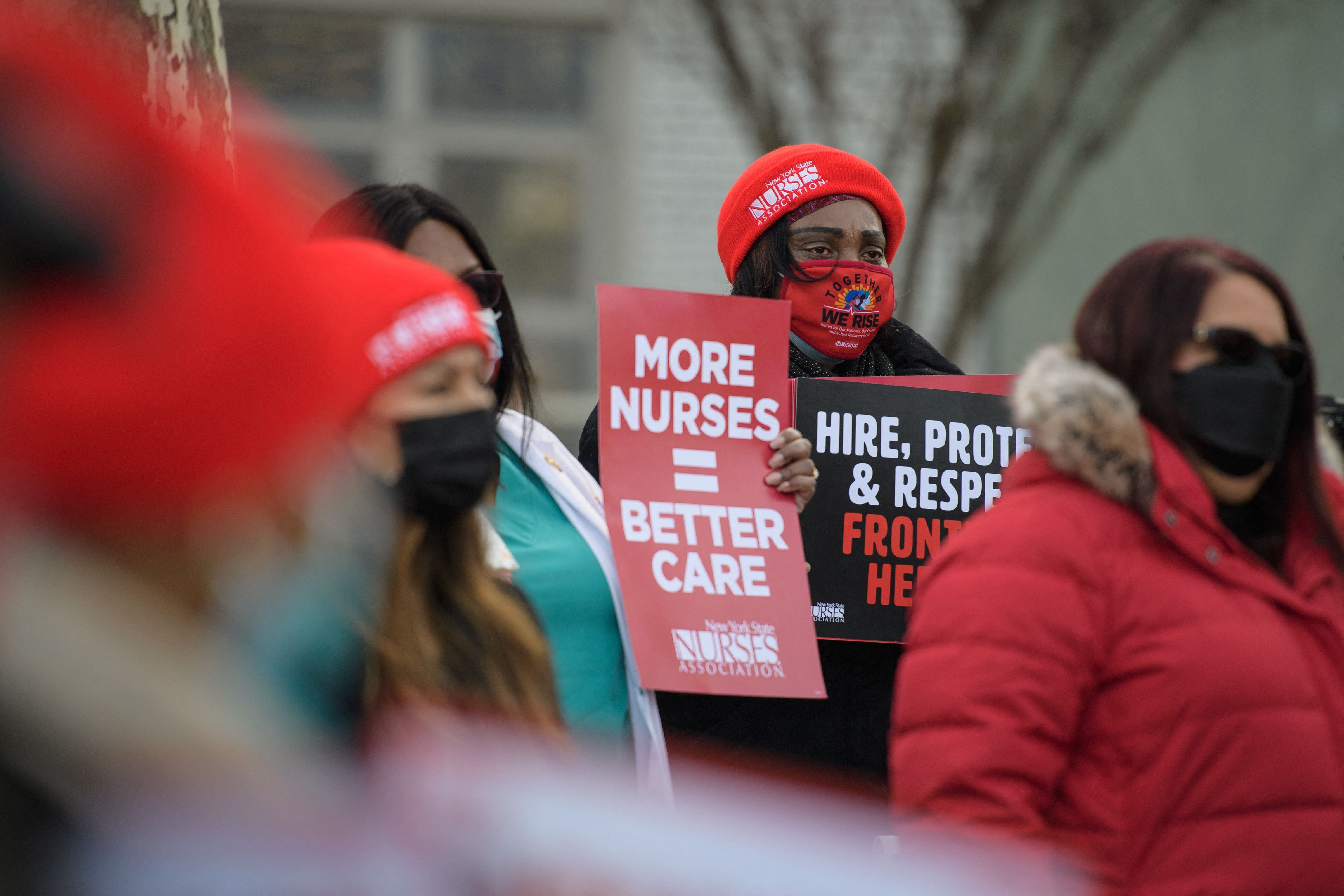Time is running out, with just four days left until a possible New York City nurses' strike at multiple major local hospitals — and one of the city's largest hospital systems is starting to take drastic measures.
But in a possible glimmer of hope, two more hospitals reached deals with the union Wednesday night, potentially putting pressure on the others to settle.
Until then, Mount Sinai Health System is beginning to divert "a majority" of ambulances from four of its facilities, and is transferring babies from its neonatal intensive care units to other hospital systems, according to a memo from hospital leadership to staff, a copy of which was obtained by News 4.
The memo from the leaders of Mount Sinai Hospital, Mount Sinai Morningside and Mount Sinai West makes clear that most issues in the ongoing negotiations have been resolved - but not all, and the clock is ticking.
Get Tri-state area news and weather forecasts to your inbox. Sign up for NBC New York newsletters.
"To do what is best for our patients, we have no choice but to proceed with our strike planning," the memo says, outlining a series of steps:
- Diverting ambulances from Mount Sinai Hospital, Mount Sinai West, Mount Sinai Morningside and Mount Sinai Beth Israel
- Cancelling elective surgeries, and scheduling only emergency surgeries at the main and Morningside facilities
- Transferring some patients. "In addition, this - sadly - means transferring NICU babies outside the Mount Sinai Health System to ensure they get the care they so desperately need."
- Discharging "as many patients as appropriate" and shifting services - inpatient care at the main and West facilities, and emergency and child psychiatry at the Morningside campus
A Mount Sinai source told News 4 that there were more than 50 NICU babies on site, slightly below the maximum capacity of 64.
The source who works in the hospital went on to say that the parents of those babies did not appear to have been notified yet that their babies would have to be moved to another facility -- although no babies have been moved as of Thursday evening.
Additionally, according to several hospital insiders and union representatives, nurses in the Mount Sinai neonatal intensive care unit are furious they were not informed about plans to transfer their frail newborn patients to other hospitals. They said that they found out after it was reported by News 4.
Several sources also said that Mount Sinai was being dishonest about transferring the NICU babies, and that it was an attempt by the hospital to make nurses look bad.
A Mount Sinai spokesperson responded, saying that the plan is to move patients on Friday if no deal is in place.
Nurses have said that there has been some progress at some bargaining tables where hospitals are negotiating with their respective staffs, but not enough progress to avoid a strike — yet.
"The New York State Nurses Association will rescind a strike notice when we reach a tentative agreement at Mount Sinai that respects nurses and our patients. Not before," said New York State Nurses Association president Nancy Hagans.
"Nurses feel abandoned and disrespected by their bosses," Hagans said. "We held the hands of dying patients, set up last FaceTime calls so dying patients could say goodbye to their loved ones."
Five private hospitals (Montefiore, Mount Sinai Hospital, Mount Sinai Morningside and West, BronxCare and Flushing Hospital Medical Center) are on notice for a potential strike starting the morning of Jan. 9 — a move that would send already busy hospitals into full-on crisis mode, and potentially have a devastating impact on care.
The union said Thursday morning that deals were struck Wednesday night at Maimonides Hospital and Richmond University Medical Center, leaving the other five still pending.
Each of the hospitals negotiates individually with their own nurses, so depending on how talks go, there could be no strikes at all, a single strike or as many as five strikes.
"It could be an enormous public health calamity," Ken Raske of the Greater New York Hospital Association previously told NBC New York. He has described the mood as among hospital managers as "extremely apprehensive."
The nurses union said there has been at least one sign of progress: All of the hospitals on the list have agreed to not cut health benefits. The union had said on Wednesday that Flushing Hospital had not made such an agreement, but a hospital spokesperson on Thursday said that they have "always maintained the healthcare benefits of our employees during active negotiations," calling it "unequivocally false" that they were considering cutting them.
"There has been some offers and progress but we are not there yet," said Hagans.
As of Wednesday, all eyes are on New York-Presbyterian Hospital and the nurses there. There was a tentative deal reached over the weekend that, if accepted, would give nurses 18 percent raises over the next three years, with added incentives to retain experienced nurses. There was also a promise to address chronic understaffing, which was the union's biggest complaint.
But there is a large caveat: NY-Presbyterian is widely considered to be the richest hospital in the city, and not all hospitals are in the same financial situation. While all the hospitals have said they are negotiating in good faith, some said they can't afford to pay as much — a big sticking point considering some hospital executives are paid in the millions.
Smaller so-called "safety net" hospitals are more reliant on lower reimbursement rates for the care they provide, like through Medicare or Medicaid. Some of the others on the list say they are hemorrhaging money, but nurses at those hospitals aren't buying the argument.
According to a source familiar with Mount Sinai's past talks, the hospital had previously offered nurses a deal that included 19.1 percent raises over three years. Management says they negotiated past midnight on Friday with the help of a mediator but were still at an impasse over wages. That deal was higher than the one extended by NY-Presbyterian over the weekend.
"If Montefiore can afford to pay its executives so much, they can't hardly cry broke when it comes to negotiate a contract with frontline nurses," said Hagans.
While it remains to be seen whether the nurses at NY-Presbyterian will accept the offer, Montefiore Hospital said Wednesday that nurse representatives at their hospital had rejected a deal that mirrored the one NY-Presbyterian offered. A spokesperson for the hospital said that nurses were offered "an 18 percent wage increase over three years, fully funded healthcare for life, and a significant increase in registered nurses in the emergency departments, among other benefits."
That development may spell trouble for other hospitals given the financial landscape. According to the Montefiore spokesperson, NY-Presbyterian posted $200 million in profits in 2022 while Montefiore posted $200 million in losses. That sort of deal was considered potentially unattainable for other hospitals on the list, but now nurses at NY-Presbyterian may think twice about ratifying the deal they tentatively agreed to (voting began Tuesday night and concludes Saturday).
Gov. Kathy Hochul's office has said previously that they are "monitoring the situation." Sources said that both Hochul and NYC Mayor Eric Adams are getting regular daily updates on the talks. While the hospitals involved are all private, meaning neither Hochul nor Adams have any formal role, some have wondered whether they would step in to apply pressure or try to broker a deal.
Aides to Gov. Hochul confirmed that she has been very engaged for many days, not directly at the bargaining table but speaking to both sides regularly and pushing both sides to get to yes. The state has also started to review the hospitals' strike contingency plans.
"We have been working with all parties to help reach a fair resolution to keep New Yorkers and health care workers safe," said Hochul spokesperson Avi Small.
NBC New York has learned that the other hospitals that have not reached agreements with their nursing staffs are starting to shell out tens of millions of dollars in nonrefundable down payments to have traveling temporary nurses on reserve — a huge expense they must shoulder, even if no strike takes place.
The GNYHA said doing so works against the interest of the nurses in the union because it forces hospitals to spend money that could go to the nurses — but it also increases the leverage of nurses once the strike notice is issued. One nurse involved in negotiations estimated the cost of trade nurses is around $10,000 a week per travel nurse. The New York State Nurses Association estimated that the mere threat of a strike has already cost as much as $32 million to temp agencies, a cost they said could surge to more than $90 million if the travel nurses have to fill in for five or six days.
"Our ERs are backed up, the tripledemic is raging," said Raske. "Even if one hospital would have a strike, it could ripple through the entire system."
The New York State Nurses Association has as many as 10,000 members threatening to conduct strikes at five hospitals where contracts expired on Dec. 31.
The union says members are upset about staffing ratios at the local hospitals, contract proposals that they feel dramatically worsen their healthcare benefits (while paying big bonuses to executives), and Mayor Adams' recent move to forcibly hospitalize psychiatric patients. All of those elements have left workers overworked and burnt out.
"We're not able to clean the patient on time, not able to give medicine on time, no breaks," said Allen. "Burnout was real, so we leave the profession and go to work at a travel agency that's going to pay us more."
In a statement Monday, a spokesperson for Mount Sinai said that their bargaining teams "continue to make good-faith efforts to pursue a contract with NYSNA that is fair to our community and responsible with respect to the long-term financial health of our organization. Mount Sinai nurses deserve the best possible working environment, wages, and benefits, and we're tirelessly pursing these to all our employees' advantage."
The statement added that the hospital system is "prepared for staffing changes, and we will do our best to ensure our patients' care is not disrupted and will do everything possible to minimize inconvenience to patients."
The average salary for nurses in New York is $93,000, and $98,000 in NYC, nurses union and the GNYHA confirmed. However, there is a big disparity between nurse pay in private vs public hospitals, where salaries are almost $20,000 less.
Source says there is a lot of frustration among doctors and NICU nurses that the hospital is now announcing plans to relocate their NICU babies, because they say there have been nurse shortages in this unit that make it impossible to maintain target nurse to baby ratios. "They didn't care about the staffing problems in the NICU until there was a threat of a strike."
All of this comes as the city deals with what is being called a tridemic - simultaneous and serious spikes in infections with COVID, the flu and the respiratory condition RSV.
The city has already issued an advisory (but not a mandate) suggesting that people go back to wearing masks indoors.



